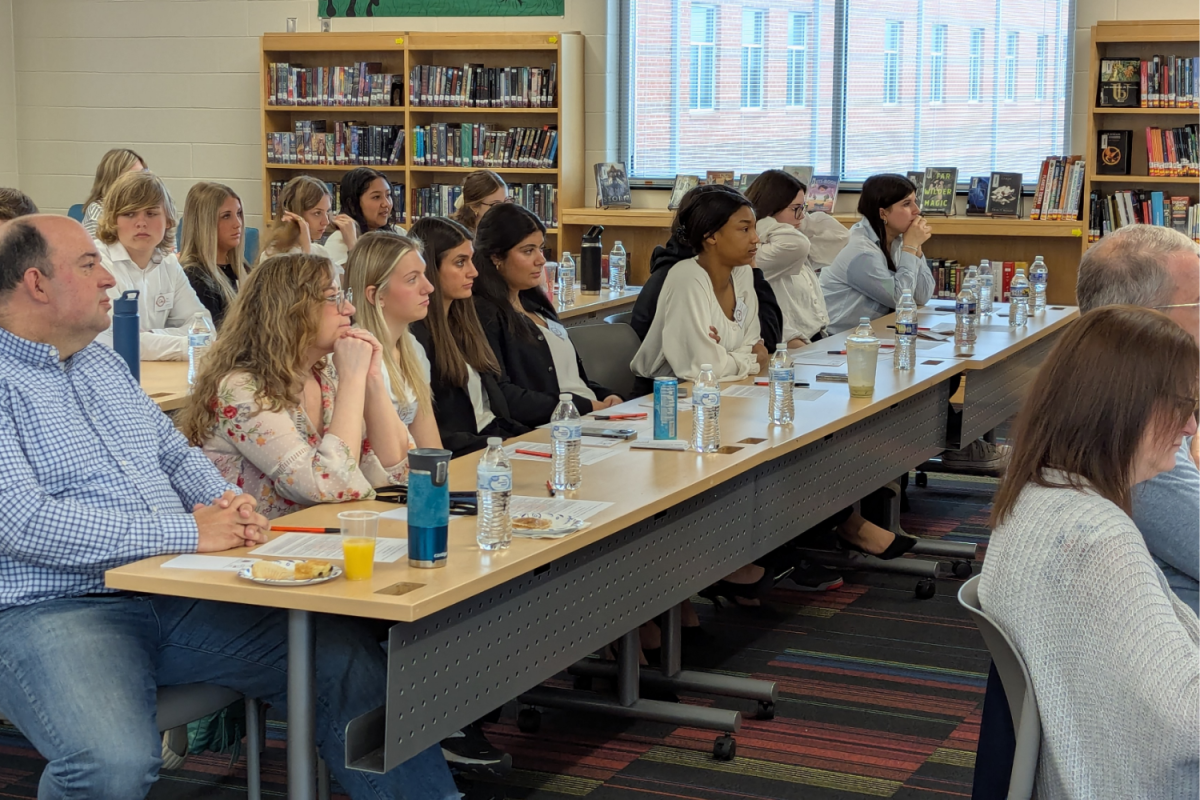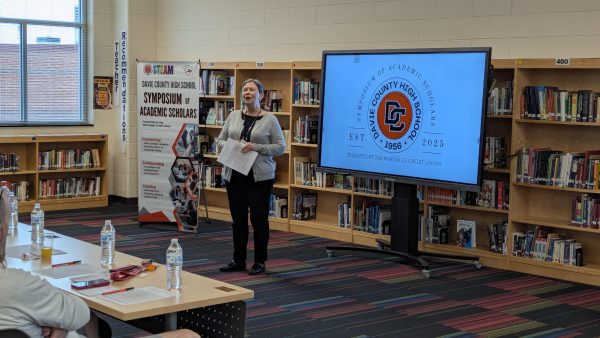
Matt Barker
Participants of the inaugural Davie High Symposium of Academic Scholars sit among an audience of their peers, parents, teachers, and community members as they await the beginning of the event.
“We are what we repeatedly do. Excellence, then, is not an act, but a habit” – Aristotle
The Davie High Learning Commons is abuzz with activity. Students stand together in groups at various corners of the library, decked out in a mixture of business casual and professional attire, running through slides one final time. There’s less than an hour to go before the room is filled with fellow students, parents, teachers, and other members of the community who will fill the seats and wait for the start of what may soon become an annual tradition.
At 9:30 a.m. on Saturday, March 15, that audience has arrived. Kathy Edminson—AP Language & Composition and Seminar teacher—welcomes the assembly and encourages her students to take in the host of people who have come to support them. They are all attendees at Davie High’s first ever Symposium of Academic Scholars.
This symposium was sponsored by the War Eagle Credit Union, who collaborated with Karla Miner, Davie’s STEAM Instructional Coordinator, to create an official sign for the event as well as custom pens and notepads for the audience and presenters. The slate of student presenters, all members of Edminson’s AP Seminar class, spoke on a variety of subjects, each centered around answering a “big question” that students sought to address or resolve. These topics included understanding effective responses to economic recessions, an analysis of the legalization of recreational drugs in the U.S., an analysis of metal detector placement, true crime entertainment and the impact on viewers, the debate of euthanizing animals, mental health stigmas in the U.S., and alcoholism in America. Students were expected to provide context for this topic along with a supported solution, testing their analytical and problem-solving abilities.
“These kinds of learning experiences benefit students who devote the time and energy to follow a scientific method of investigation,” Edminson said. “The process is multi-tiered and challenging; it sends students back to the hypothesis again and again as they work through the process.”
This seminar is a vital step of the AP Capstone program, a program from College Board aimed at teaching and developing skills in research, analysis, presentation, evidence-based debate, and collaboration. Students worked in groups but performed independent research, each approaching the topic differently. The group would then converge their findings to form their final presentation. Each group is given 15 minutes to present, including follow-up questions, which they must answer on the spot from Edminson. To combat the uncertainty of open-ended questions with no prior preparation, students like Catherine White readied themselves with extensive practice and help from one another.
“In the end, I believe my team did a great job of preparing for the oral defense,” White said. “It was not a battle we fought alone either; all of our classmates worked exceptionally well together and listened to other teams practice…My team and Precious Jimerson’s team sort of banded together towards the end of the project and really helped each other get prepared for those oral defense questions during practice. That’s the primary reason I was able to get up there and answer my question on the spot, because I familiarized myself with what each question was asking and how each of my team members’ research would mold to that question.”
Junior Ella O’Toole, another participating student whose group covered Alcoholism in America, shared a similar experience in preparing for the oral defense
“The individual questions were definitely stressful since none of us knew what questions we would be asked by Ms. Edminson.”
White’s description of her experience further demonstrates that the symposium was a collaborative effort from beginning to end.
“It’s no longer about you,” White said, “so you have to familiarize yourself with the ‘lens’ that all your teammates chose…in order to fully answer the question.”

For the advantages that being in a group offers, navigating the team dynamic also presented one of the assignment’s biggest hurdles.
“The team approach is challenging for students—we all have to learn to trust that others are as invested in excellence as we are individually,” Edminson said. “In this class, I observed students pulling together for the good of the team, contributing their own brand of excellence, reaching presentation day stronger than anticipated.”
While Edminson observed that her students were able to navigate these difficulties as their presentation deadline approached, students like White attested to the fact that their group was “slightly stumped” as the project began.
“You don’t get a topic or stimulus materials for the IRR [Individual Research Report] and TMP [Team Multimedia Presentation] as you do for the IWA [Individual Written Argument] and IMP [Individual Multimedia Presentation], so it opens up the floor for a billion different topics and related questions,” White said. “While I think that freedom can be great for many students, it can also be intimidating and, in result, quite stressful.”
However, the students proved to be incredibly efficient, able to complete their presentations before their allotted time was up, which created an unintended complication for the event: they were ahead of schedule. This may be because the event was originally scheduled to take place in the auditorium, so time was built into the schedule for teams to transition on and off the stage. After the first three presentations, there was a brief intermission to account for this shift in time, but the presentations still concluded well ahead of schedule.
The 2024-2025 school year marks the first year of AP Seminar being offered at Davie High, and the presence of scholarly events such as these is a huge step in creating a better educational atmosphere for Davie County to grow in.
“It benefits the entire learning community, by the way,” Edminson states. “Teachers collaborate in these experiences, too, leaning on the team’s strengths for student success. This kind of learning breaks new ground for students and teachers, and in the end, the celebration is real!”
Edminson and other faculty involved in the event see these students as trailblazers in pushing the next generation to embrace academic excellence and demonstrate mastery of the research and presentation process that is vital to many career paths. The hope is that the skills they have developed in preparation for the seminar will aid them in all their future ventures.
“The most impactful thing I took away from this experience is this very simple sentiment that Ms. Edminson repeated to us throughout the entirety of our research: ‘Remember that you are the expert.’ When taking on something as big as an AP presentation, you need to have that confidence in yourself… Remember that you and your teammates are the ones that know this the best; you know exactly what you’re doing, and now it’s your time to show it. You’ve researched this for an extensive period of time and put a considerable amount of effort into it. So when you’re up there, and it’s time to start, you must remember those 4 words: ‘You are the expert.’”
The statutes of the Symposium of Academic Scholars encourage identifying problems and addressing them by collecting information and raising awareness. This procedure arguably resolves issues in the most effective manner as it aims to educate the general community and implore them to ponder issues in our society. For Edminson, it has been inspiring to see students take the initiative to learn this method of resolution despite the stereotypes that surround the current generation.
“People as a whole like the sensationalism of bad press, so we hear the negative stories all too often of groups stereotypically caught being bad. High schoolers are not immune to portrayals of bad reputations…I am grateful that students at the symposium experienced an audience of their peers, their families, their administrators, and their teachers honoring their excellence, catching them being authentically brilliant! Yes, they shattered some stereotypes that Saturday!”
When asked about her takeaways from the symposium, Edminson described how synergy between peers led to the accomplishment of spectacular goals.
“I watched teams of students take the stage, listened as they presented researched problem-solution investigations, and witnessed jubilation as they heard the applause of the crowd at the conclusion. My primary takeaway? Hard tasks provide mountain-top experiences for those who meet their goals as a team.”
Edminson concluded the event by thanking John Hamby-Lattimore with the Credit Union for sponsoring the event and urged the students to take in the moment.
“I hope you take the time to look around the room and see all the people…They believe in you. They believe in your future. I couldn’t be more happy to have my name associated with yours.”